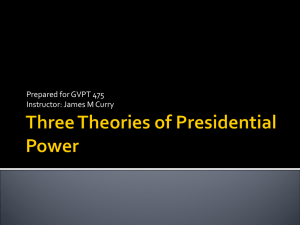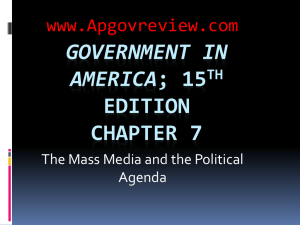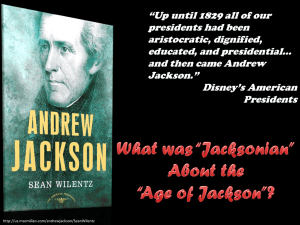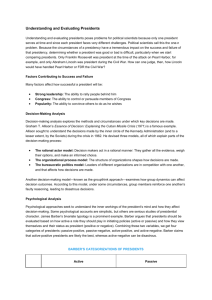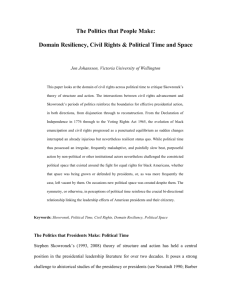320 syllabus
advertisement
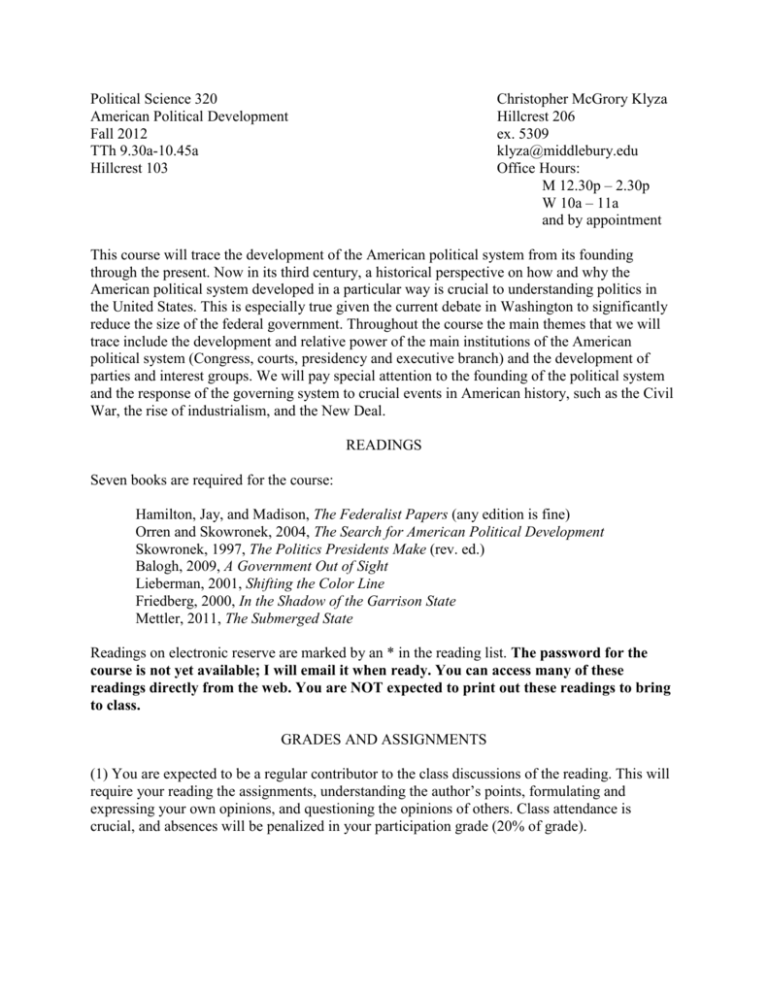
Political Science 320 American Political Development Fall 2012 TTh 9.30a-10.45a Hillcrest 103 Christopher McGrory Klyza Hillcrest 206 ex. 5309 klyza@middlebury.edu Office Hours: M 12.30p – 2.30p W 10a – 11a and by appointment This course will trace the development of the American political system from its founding through the present. Now in its third century, a historical perspective on how and why the American political system developed in a particular way is crucial to understanding politics in the United States. This is especially true given the current debate in Washington to significantly reduce the size of the federal government. Throughout the course the main themes that we will trace include the development and relative power of the main institutions of the American political system (Congress, courts, presidency and executive branch) and the development of parties and interest groups. We will pay special attention to the founding of the political system and the response of the governing system to crucial events in American history, such as the Civil War, the rise of industrialism, and the New Deal. READINGS Seven books are required for the course: Hamilton, Jay, and Madison, The Federalist Papers (any edition is fine) Orren and Skowronek, 2004, The Search for American Political Development Skowronek, 1997, The Politics Presidents Make (rev. ed.) Balogh, 2009, A Government Out of Sight Lieberman, 2001, Shifting the Color Line Friedberg, 2000, In the Shadow of the Garrison State Mettler, 2011, The Submerged State Readings on electronic reserve are marked by an * in the reading list. The password for the course is not yet available; I will email it when ready. You can access many of these readings directly from the web. You are NOT expected to print out these readings to bring to class. GRADES AND ASSIGNMENTS (1) You are expected to be a regular contributor to the class discussions of the reading. This will require your reading the assignments, understanding the author’s points, formulating and expressing your own opinions, and questioning the opinions of others. Class attendance is crucial, and absences will be penalized in your participation grade (20% of grade). 2 (2) Each student will be responsible for presenting a 5-10 minute report on a topic related to a particular class. These topics will be selected from a list circulated in class. This presentation may be the basis for one of the three short papers discussed below (10% of grade). (3) You will be required to write three short papers (4-5 pages) during the semester. The topics will be distributed in class. Due dates for the papers: Paper 1-September 27th, Paper 2-October 30th, Paper 3-November 29th (45% of grade; 15% per paper). (4) A 15-page paper examining the political development of a particular agency or institution, or the political system during a time period in the United States. A one-page prospectus is due on November 6th; the final paper is due Tuesday December 11th (25% of grade). NOTE: All assignments must be completed in order to pass the course. All late papers will be penalized one-half letter grade per day. September 11 Introduction: What Should Government Do? CONSTRUCTING A NEW GOVERNMENT 13 Designing the Government Reading: Articles of Confederation; Constitution. 18 The Debate over the Constitution Reading: The Federalist Papers, Numbers 1, 9, 10, 14, 15, 23, 39, 45, 51, 85. THEORY 20 The Search for American Political Development Reading: Orren and Skowronek, The Search for American Political Development, pp. 1-77. 25 continued Reading: Orren and Skowronek, The Search for American Political Development, pp. 78-171. continued PAPER 1 DUE Reading: Orren and Skowronek, The Search for American Political Development, pp. 172-201. 27 THE NINETEENTH CENTURY AND THE HIDDEN GOVERNMENT October 2 The Role of the President and Jefferson Reading: Skowronek, The Politics Presidents Make, pp. 1-85. 3 4 The Hidden Government Reading: Balogh, A Government Out of Sight, pp. 1-111; *William Novak, 2008, “The Myth of the “Weak” American State,” American Historical Review, 113: 752-772. 9 The Hidden Government: Political Economy and Expansion Reading: Balogh, A Government Out of Sight, pp. 112-218. The Hidden Government: Letters, Law, and the Civil War Reading: Balogh, A Government Out of Sight, pp. 219-308. 11 16 18 NO CLASS—FALL BREAK The Hidden Government: The Courts and into the Twentieth Century Reading: Balogh, A Government Out of Sight, pp. 309-399. 23 Presidents Monroe, Adams, Jackson, and Polk Reading: Skowronek, The Politics Presidents Make, pp. 86-176. Presidents Pierce and Lincoln Reading: Skowronek, The Politics Presidents Make, pp. 177-227. 25 THE PROGRESSIVE ERA: THE NATIONAL STATE RESPONDS TO CORPORATE CAPITALISM 30 The State of Courts and Parties PAPER 2 DUE Reading: *McCormick, “The Party Period and Public Policy,” pp. 197-227; *Schwartz, A History of the Supreme Court, pp. 174-202. November 1 Reconstituting a New American State Reading: *Skowronek, Building a New American State, pp. 3-46, 165-176, 285292; Skowronek, The Politics Presidents Make, pp. 228-286. THE NEW DEAL AND THE THIRD AMERICAN REVOLUTION? 6 8 The Birth and Evolution of the Welfare State PAPER PROSPECTUS DUE Reading: Lieberman, Shifting the Color Line, pp. 1-117; Skowronek, The Politics Presidents Make, pp. 287-324. continued Reading: Lieberman, Shifting the Color Line, pp. 118-234. BECOMING A WORLD MILITARY POWER 13 The Cold War and State Building Reading: Friedberg, In the Shadow of the Garrison State, pp. 1-80. 4 15 continued Reading: Friedberg, In the Shadow of the Garrison State, read two among chapters 3, 4, 5, 5, 7, or 8; pp. 340-351. THE GROWTH OF GOVERNMENT AND THE CONSERVATIVE RESPONSE 20 22 27 29 President Johnson Reading: Skowronek, The Politics Presidents Make, pp. 325-360. NO CLASS—THANKSGIVING BREAK Presidents Carter, Reagan, and Beyond Reading: Skowronek, The Politics Presidents Make, pp. 361-464. Why We Don’t Like Government (But Love Social Security) PAPER 3 DUE Reading: Mettler, The Submerged State, pp. 1-68. December 4 continued Reading: Mettler, The Submerged State, pp. 1-123. 6 Conclusion: What Should Government Do? 11 FINAL PAPER DUE (TUESDAY) by 4.00p, Hillcrest 206 (my office).
